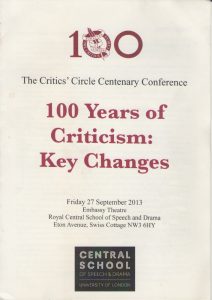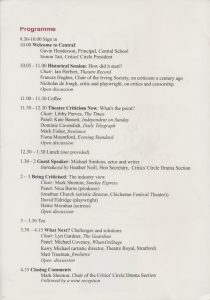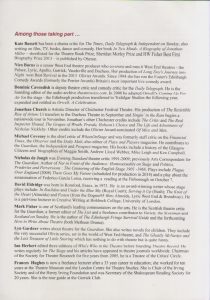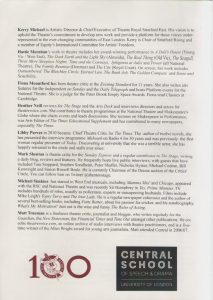In 2013 the Critics’ Circle celebrated 100 years since it was first established. Different sections of the organisation marked the centenary in different ways. For the Drama section, Ian Herbert suggested that we hold a conference (and arranged for Frances Hughes to speak on the history of the Critics’ Circle). The primary responsibility for decisions and organisation of the format and people involved fell to me as Secretary of the Drama Section at that time.
The event took place at the Central School of Speech and Drama, London, and featured speeches and panel discussions on theatre criticisms’ past, present and future. An article of mine in the Camden New Journal announced the conference and raised themes about the status of criticism. Afterwards, Jane Edwardes wrote up the event for the Critics’ Circle itself whilst Howard Loxton summarised it for the British Theatre Guide. All photography was by Karla Gowlett (www.photoperspective.co.uk).
Condition: critical – In the Critics’ Circle centenary year, a debate on the changing role of criticism is timely
(Camden New Journal)
Also available as a single image here.
The event was also trailed by Nick Curtis in his column (Evening Standard)
Also available as a single image here.
An overview of the panels and the people involved may be seen in the conference programme:
(Ian Herbert arranged the printing)
The audio for three sections of the conference was recorded and remains available at TheatreVoice, though unfortunately the sound quality is not up to their usual standards.
Historical Session: How Did It Start?
The conference began with a welcome from Gavin Henderson of the Royal Central School of Speech and Drama and Critics’ Circle President Simon Tait. The panel discussed the history of the Critics’ Circle from its formation by theatre pioneer J T Grein. Ian Herbert noted that the roll call of critics in 1913’s Who’s Who in the Theatre listed a full 50 including one for Sporting Life.
Frances Hughes, Chair of the Irving Society, spoke on criticism a century ago in her speech entitled Before 13, referring both to criticism before 1913 and the age at which people catch the theatre bug. She referred to four influential and contrasting characters who shaped criticism thereafter: Max Beerbohm, George Bernard Shaw, Grein and Charles Montague. Beerbohm oscillated between celebration and distaste for Shaw, and summarised his own view on criticism: “I do not care about good criticism, I like better the opinion of strong, narrow, creative personalities”.
Nicholas de Jongh, critic and playwright, spoke on censorship and the weak contribution critics had made to ending it, suggesting this was a symptom of a tendency for critics to be too conservative in more ways than one. The Lord Chamberlain kept a smothering grip on drama: clamping down on even implied sex, outlawing any mention of homosexuality and defanging satire. Whilst playwrights and other writers led by John Osborne pressed hard for elimination of the role, notably in 1907, critics (with a few honourable exeptions in Grein, Shaw and later Kenneth Tynan) mostly acquiesced. Indeed critic Harold Hobson wrote in praise of the role in 1967, shortly before it was finally abolished. De Jongh exorted critics to atone for this inglorious history by supporting groundbreaking theatre and especially sharp satire.
Criticism Past (British Theatre Guide)
The Critics’ Circle Centenary Conference: How Did It Start? (TheatreVoice)
Theatre Criticism Now – What’s the Point?
Libby Purves opened discussion on the purpose of criticism and how critics are managing with the task of carrying it out in the current climate. (Purves is one of two critics on the panel who had recently lost their permanent role on a newspaper, whilst Fiona Mountford noted that at her paper the Evening Standard there had recently been a 25% cut in space for reviews.)
The role of critics, it was suggested, is to be the link between the production and the public, and also posterity. Critics should seek to capture the performance as vividly and in as much detail as possible for those who could not be there. Perhaps they should capture the audience reaction too, even if it was at odds with their own.
Various questions stem from this: is it possible to give a thoroughgoing review with a cramped word limit? Perhaps the limited space forces a reviewer to distil their work. If you can’t say it in 220 words is it really worth saying, wondered Mountford. But there must be limits to that. Can one ever say something meaningful in a tweet for example. Dominic Cavendish felt that we are living through a golden age of theatre but that great changes in the publishing medium is making it difficult to report what is happening as fully as one would wish.
Alongside this is the question of whether the critic is merely a recorder or making a contribution to push the form onward. This also ties in with the question of professionalism – Purves welcomed a variety of new voices whilst worrying about the related dumbing down of arts coverage. Factors such as the influence of star ratings are also important. Not least: does anyone read a review if it comes with a rating of 3 stars or fewer?
The importance of a critic as an independent voice was also emphasised in a world in which powerful PR machines are pushing one viewpoint of a play.
Theatre Criticism Now (British Theatre Guide)
Guest Speaker Michael Simkins
Prolific actor of stage and screen Michael Simkins is familiar with the exeperience of being criticised. His then newly published book The Rules of Acting reflected on this experience, noting his view that there are two types of actor: those who openly read reviews and those who say they don’t but do anyway.
Simkins was once offered the chance to be a critic, but eventually turned it down, fearing that it would permanently damage his friendships with other actors. He also shared one of his harshest reviews: a sewage worker broke the industry-wide taboo on using a term directly meaning excrement to describe the new drama he was in.
Conversely he’d had some of his friendliest reviews from previous Critics’ Circle president Jack Tinker – no doubt unrelated to his having previously lived in the same block as Tinker’s mother and having been occasionally called on to help with household problems.
Being Criticised – The Industry View
On the relationship between critics and those in the theatre, Mark Shenton opened discussion by referring to the dwindling numbers of critics everywhere and the fact that three of LA’s leading theatres responded to this by writing an open letter to sound the alarm. In this they said that while criticism could be hard to hear it was valuable as they depend on critics to start a conversation.
Director Jonathan Church agreed, describing critics as fellow travellers. Favourable criticism could start or change career trajectories. A high-level of professionalism and knowledge is important and even when audiences came in spite of unimpressed critics those weren’t the productions theatre-makers looked back on with the most pride. Casual reviews either by historical gentlemen amateurs or modern social media users are no substitute. (Mark Shenton noted that 20% of theatre-goers now undertake some form of public ‘review’ if you include tweets and Facebook posts.)
Hattie Morahan said she paid attention to criticism except of shows that she was in at the time, but was increasingly viewing opinions online alongside critics she was familiar with. She also criticised the artificial atmosphere and pressure of the press night, and the reductive nature of star ratings.
Nica Burns agreed, though commented that alternatives to press nights had their drawbacks – not least the possibility of one critic breaking an embargo in order to be the first with a review out. Also having all the critics on one night at least ensured that particular pressure was out of the way.
David Eldridge expressed his experience that while reviews had an exhilarating or devastating effect before he became established, those feelings ebbed each time. Now a review is more likely to prompt profound reflection six months later.
In reply to Mark Shenton, Jonathan Church in particular conceded that productions sometimes alter in response to a critical review, noting that critics are good at sensing that something isn’t working.
Nica Burns expounded on the importance of critics when there is a change or innovation in theatre, by contributing to a conversation about something which audiences may struggle to respond to. Continuing the theme of the value of good criticism, she also noted the experience of an American comedian. He was surprised and impressed that the reviews of British critics showed deep insight into the way his show was put together, with the quality of work highlighting what had been missing from reviews of his work before.
Overall, the panel believed that the divide and distrust between the industry and critics is greatly exaggerated with David Eldridge describing a director who had tried to enforce that divide in colourful terms(!)
Being Criticised (British Theatre Guide)
The Critics’ Circle Centenary Conference: Being Criticised – The Industry View
What’s Next? The Future of Criticism
Lyn Gardner opened by noting that whilst the internet and other technologies could be seen as an advance comparable to the invention of the printing press, that that invention hadn’t done much for monks crafting illuminated manuscripts. Is the current situation comparable to that for critics? Is the profession in crisis?
Matt Truman replied that yes, perhaps criticism is in crisis, but that might be a good thing. Critics are by nature backwards-looking folk, inclined to compare with the past rather than invent the future. Newspapers are dying and reluctant to grant space or payment. Out in the blogosphere a critic can have plenty of space to write, and their value is based entirely on what they write rather than where they write it. Criticism becomes more a matter of contributing to a community.
Kerry Michael noted that the community local to his theatre collectively speak 160 languages. He felt that professional critics no longer match the demographic of his (potential) audience, and that it was unclear that the same plays would speak to both. He established ‘tweet zones’ at the theatre for ordinary audience members to publicly respond to the play immediately, and also experimented with letting bloggers in before the critics. The audience were even given a role in setting the programme.
Michael Coveney agreed that the rate of change for critics with the state of newspapers and expanding blogosphere was near-impossible to cope with.
He disagreed with MT that being a critic is a ‘team sport’. A continuing conversation may be valuable, but a critic should be acknowledged for his experience, knowledge and ability to write. The two clashed over the importance of stiff word limits.
Coveney, echoing Fiona Mountford from earlier, argued that someone who cannot say something interesting in 200 words is not a critic, noting that some great critics including Kenneth Tynan had proved themselves with short reviews on popular papers first.
MT referred to a review of Simon Stephens’s Grounded by Kate Maltby on the Conservative Home blog(!) which offered a different take to other reviews which needed space to expound. MC replied that critics’ responses had been too uniform due to the danger of living in a bubble (as Nica Burns said) and the word limit was not crucial.
Likewise, MC argued to KM that if there is a problem with critics being representative that cannot be bypassed by the theatre bringing other people in instead.
With the discussion opened to the audience, a number of topics were touched on:
LG suggested that the blogosphere offered the chance for a critical response to plays which the mainstream critics were not paying attention to – although this chance wasn’t being taken often enough.
An audience member suggested that the traditional critics emphasised theatre as literature whilst the writers of the blogosphere had moved on to emphasising performance.
Another audience member (who ran a course teaching criticism) argued that far from democratising criticism, the shift away from paid, professional criticism was handing reviewing back to the wealthy. Some of her best students couldn’t afford to be constantly going to the theatre and writing about it if their worklife was separate and unpaid internships weren’t an option.
Another (who ran a blogging platform) picked up on the theme of continuing conversation, noting that their most popular posts were those featuring two critics in debate. MT picked up on this, noting that his own often contentious exchanges with Andrew Hagan were open to view.
MC questioned whether there was to be a move away from the idea of a canon of critical literature. Like Frances Hughes he had a large collection of James Agate volumes and saw himself as a minor descendent of the tradition – that which the conference was marking after all. He noted that Harold Hobson – whether he deserved Nicolas de Jongh’s criticism or not – was instrumental in bringing Harold Pinter and Samuel Beckett to prominence. Perhaps as Hobson and Tynan had specific battles to fight and that not true for today’s critics, their importance was less obvious. (MC and MT tussled over whether there was a currently a fight to find a more relevant theatre for the younger generation.)
The panel wound up with final exchanges with the audience on the subjects of the link between established and younger reviewers, and how the latter can be helped, (note: The International Association of Theatre Critics does run seminars for younger critics) the potential loss of the intellectual aspect of reviewing and the ever present question of payment.
What next? (British Theatre Guide)
Mark Shenton closed the formal conference and discussion continued over wine (arranged by Ian Herbert).
(Mark very kindly presented me with flowers for my contribution in organising the conference)
100 Years of Criticism: Key Changes (The Critics’ Circle)
Theatre feature: 100 Years of Criticism: Key Changes (British Theatre Guide)
Responses following the conference included articles by Michael Coveney in Whats On Stage and Mark Shenton in The Stage.
Critics’ Circle holds hands and worries about the future (Whats On Stage)
What hope is there for young(er) critics? (The Stage)
Critics are too thin-skinned says Nimax Theatres chief (Nicola Merrifield in The Stage)
Stop Surviving, Start Serving – The Future of Criticism (Matt Trueman – archive)
What is the Future of Theatre Criticism? (Jake Orr’s blog)
















































































